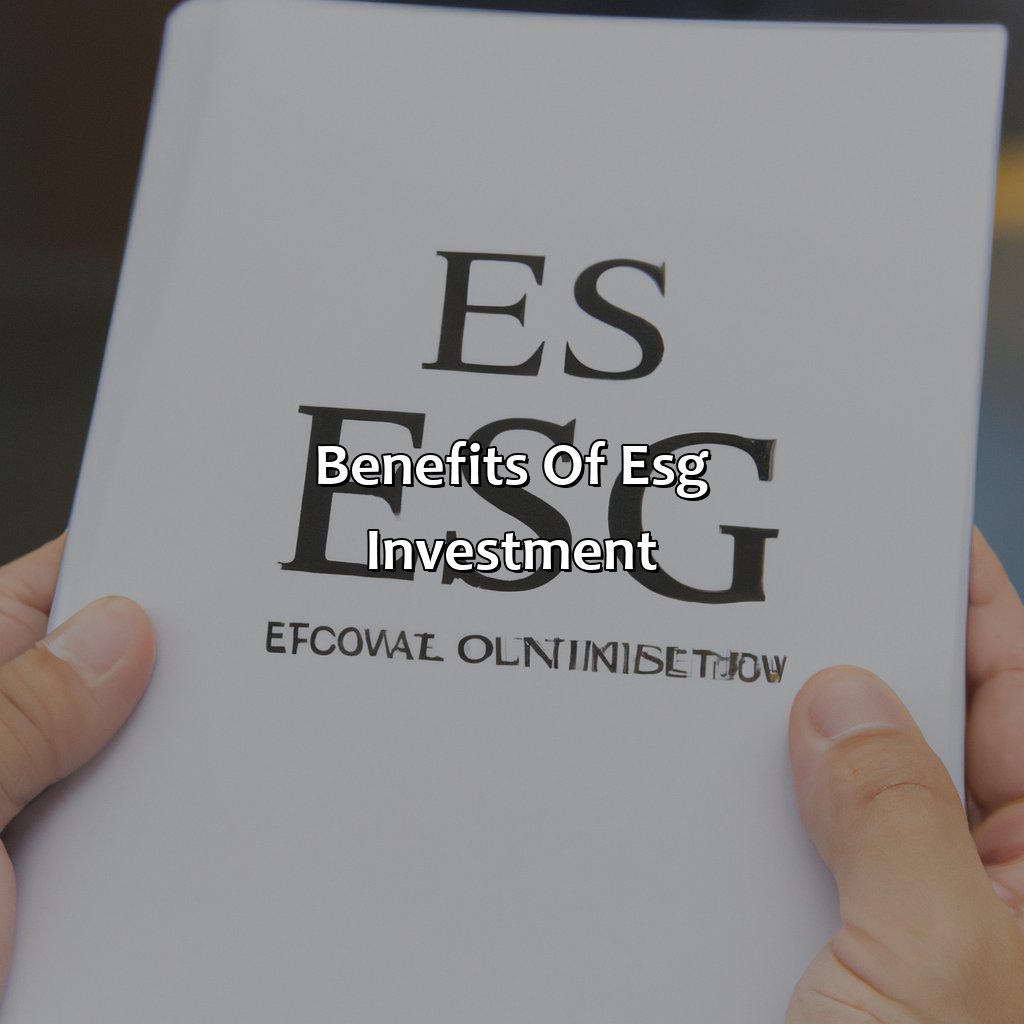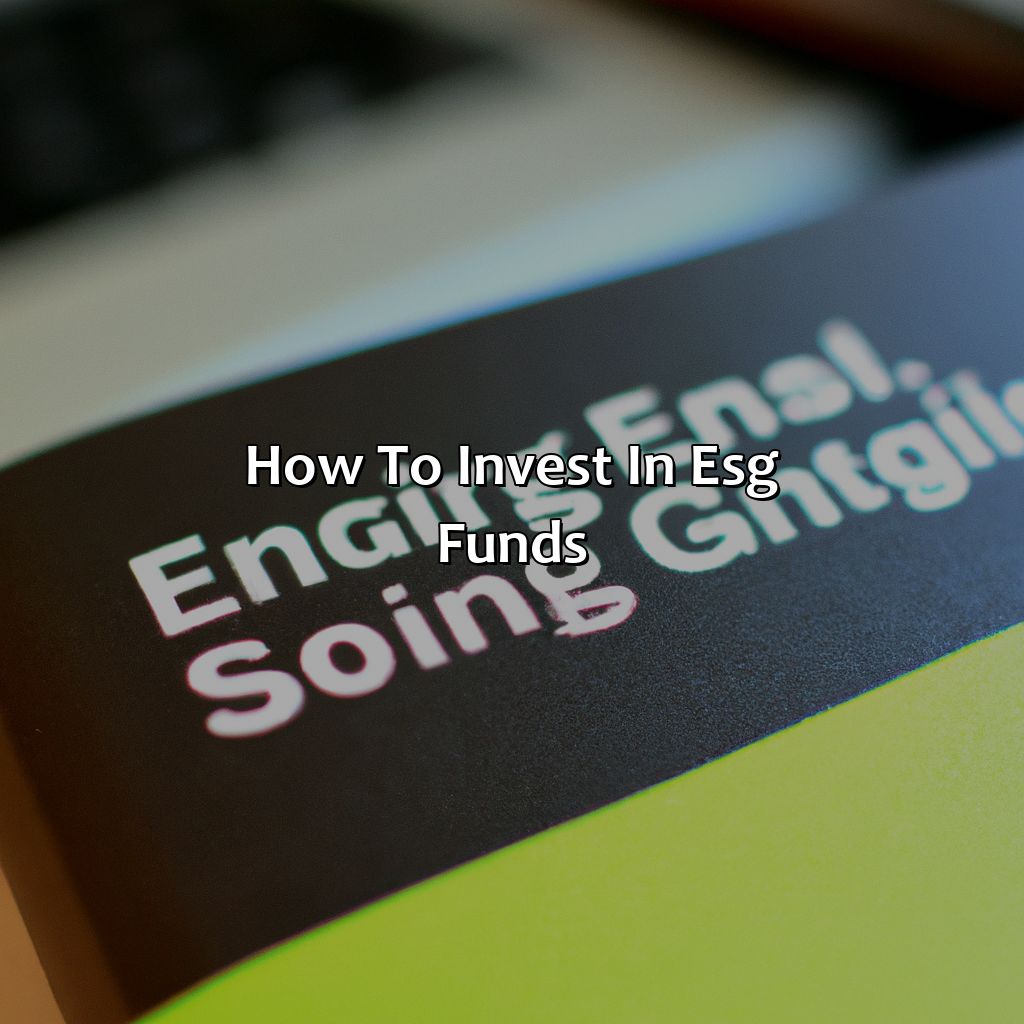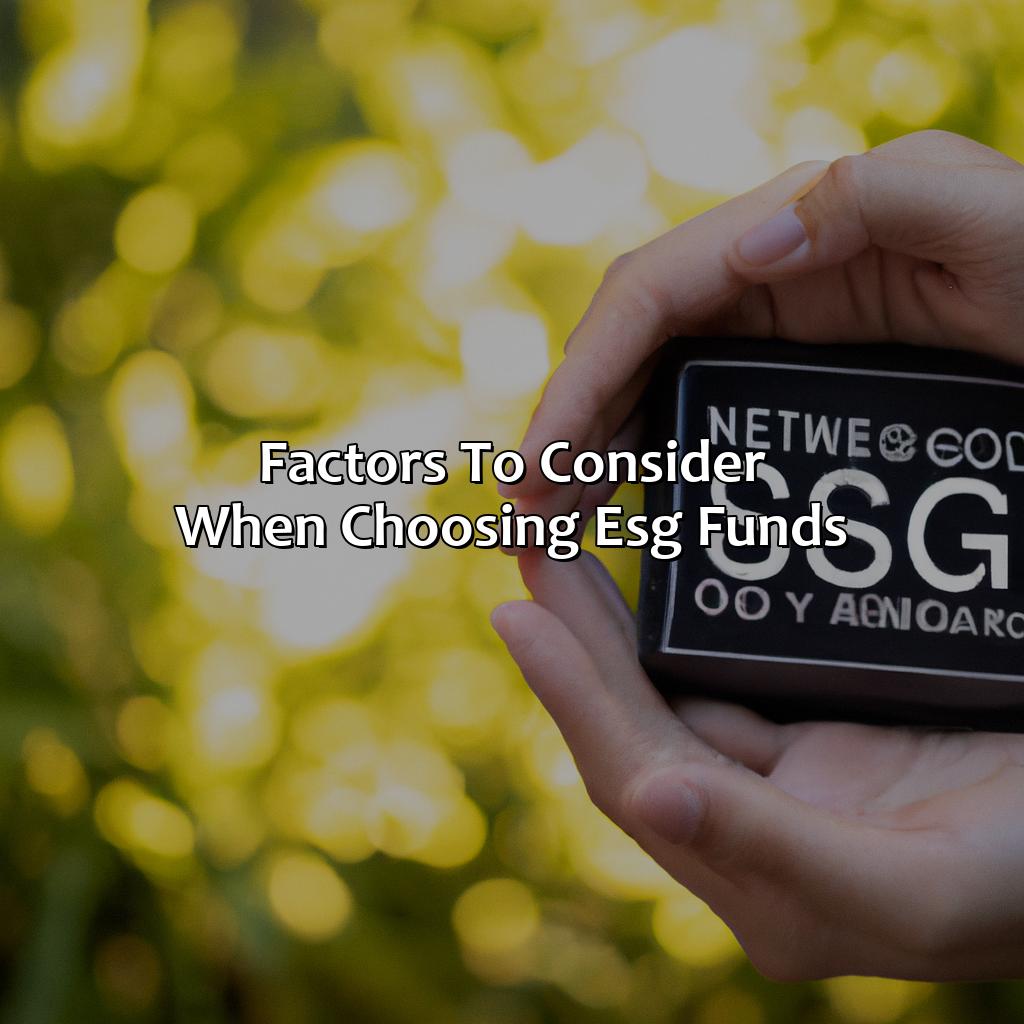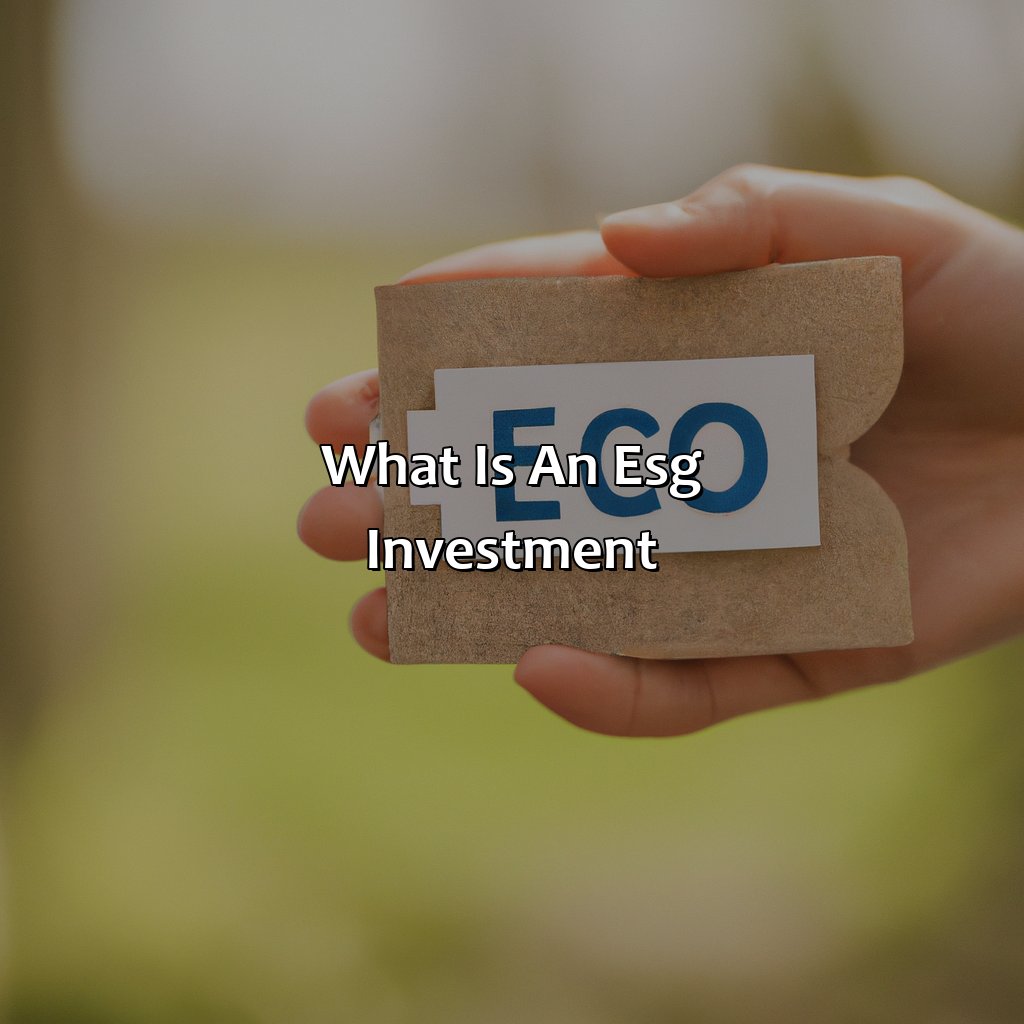What Is An Esg Investment?
Key Takeaway:
- ESG investment stands for Environmental, Social, and Governance. It is an investment approach that focuses on investing in companies that follow sustainable practices and operate ethically.
- ESG investment has several benefits such as improved financial performance, better risk management, positive environmental and social impact, and good governance. Investing in ESG funds can help investors align their investments with their values and contribute to the greater good of society.
- Investing in ESG funds involves identifying a reliable ESG framework, conducting thorough research on companies, and selecting a suitable ESG fund based on performance track record, expense ratio and fees, investment minimums, and approach to ESG investing.
Are you interested in investing, but confused about the concept of ESG investing? Find out what it is and why it’s important right here. You will learn how to become an ESG investor and how to make the most of your investments.
Understanding ESG Investment
ESG Investment: Understanding the Concept
ESG investment refers to investing in companies that prioritize Environmental, Social, and Governance issues. It is an investment strategy that aims at achieving sustainable investments, taking into account the impact of business activities on the planet and society. The primary goal of ESG investing is to generate long-term value, considering non-financial factors such as climate change and social justice.
When investing in ESG companies, investors scrutinize corporate policies on issues such as carbon emissions, labor practices, and executive remuneration. ESG strategies seek to balance financial returns with social and environmental responsibility. This is part of an overall trend whereby consumers and investors are seeking to align their values with their financial goals.
ESG investing is gaining in popularity, with assets under management in these mutual and exchange-traded funds reaching new highs in recent years. In 2019, ESG investments accounted for over $20 trillion globally, a 34% increase from 2016. The trend is expected to continue as more investors seek to achieve their financial goals while promoting social and environmental sustainability.
According to a report by Morgan Stanley, companies with strong ESG performance have better operational performance and are less risky to invest in. In other words, ESG investing doesn’t just benefit society, but it can also lead to better financial returns. As a result, investors can achieve their financial goals while contributing to a more sustainable planet and society.

Image credits: retiregenz.com by James Arnold
Benefits of ESG Investment
Want to understand ESG investment advantages? Dive into this section! ESG investing lets you make an impact by selecting responsible and sustainable companies. We will explore five sub-sections that outline the benefits of ESG investment. Risk and governance are essential factors to consider.

Image credits: retiregenz.com by James Jones
Financial Performance
When it comes to the Economic Performance of ESG Investments, there are significant benefits that investors can reap. Let’s look at some data-backed factors that demonstrate the positive correlation between ESG investments and financial performance.
| Factor | Data-Backed Evidence |
| Better Company Reputation | Companies with higher ESG ratings tend to have a stronger reputation which results in improved financial performance. |
| Risk Management | ESG Investing focuses on risk management which leads to fewer surprises for investors and fewer costly mistakes for companies. |
| Reduced Cost of Capital | Many studies show that companies with higher ESG ratings face lower costs when raising capital because they are perceived as less risky investments by investors. |
Aside from these three vital factors, there are also other factors like regulatory favoritism, employee productivity, attracting talent, innovation, brand loyalty, etc.
Investors must keep in mind that ESG investing is not a ‘get quick rich’ scheme. It is an investment strategy focused on promoting sustainable growth while ensuring a reasonable return on investment. Therefore it is suggested that investors should focus on long-term goals and select an appropriate portfolio based on their financial situation, risk appetite, and investment horizon. Investors should see beyond the short-term volatility of the market and trust responsible engagement strategies that promote sustainable development goals.
ESG investment: because saving the planet is great, but saving your portfolio from risk is even better.
Risk Management
By incorporating environmental, social and governance (ESG) factors into investment decisions, risk management can be enhanced. ESG investing uses a set of criteria to evaluate companies based on their impact on the environment and society, along with their corporate governance practices.
Investors who consider ESG factors before making investment decisions are better equipped to manage risks associated with environmental and social issues. ESG investing encourages companies to adopt sustainable practices and promotes transparency in reporting about material risks that may impact their performance.
Furthermore, applying a holistic approach to risk management by analyzing ESG factors allows investors to identify long-term risks that may not be apparent using traditional analytical methods. This enables investors to mitigate potential financial and reputational damage caused by unsustainable practices and helps maintain a positive long-term outlook for their portfolio.
To further improve risk management strategies, investors can consider integrating ESG data into quantitative analysis models or partnering with ESG research providers to ensure they have access to comprehensive information. Additionally, seeking out engagement opportunities with these companies allows investors an opportunity to influence positive change while simultaneously managing risk.
ESG investing: because being eco-friendly is the new black, even for your portfolio.
Environmental Impact
Investing in companies that prioritize ESG factors can have significant positive effects on the environment. These investments focus on reducing environmental risks and promoting sustainable development, minimizing negative impacts such as pollution and carbon emissions. By investing in ESG companies, investors are supporting businesses that align with their environmental values while working towards a more eco-friendly future.
In addition to mitigating harm to the environment, ESG investments promote sustainable practices and conservation efforts. Companies in this sector actively seek to reduce waste and promote resource conservation by using renewable energy sources and developing new technologies to minimize environmental damage. This dedication leads to better outcomes for the environment and sets these businesses apart from traditional industries.
ESG food manufacturers are implementing environmentally sound techniques at every step of their operations. According to a report from Refinitiv, there has been an increase in funding for sustainable food producers due to investor demand for ethically-developed products. Food producers who practice ethical farming standards that result in no chemical fertilizers or pesticides use minimal water requirements improving both sustainability and nutritional value.
Sources show that 59% of consumers are willing to pay more for products sold by a company committed to social responsibility, highlighting the benefits of incorporating ESG investment strategies into portfolios.
ESG investment: where you can save the world and your wallet at the same time, because being ethical is just good business.
Social Impact
Investments made with the aim of promoting social welfare and making positive changes are considered socially impactful. ESG investments, which stands for Environmental, Social, and Governance, are often viewed as a way to achieve this objective. Such investments take into account various factors such as human rights, labor standards, and community development. This ensures that not only investors but also society benefits from these investments.
One significant aspect of ESG investing is social impact. This means that money invested in a company or project not only yields profits but also has a positive social outcome. Companies that prioritize diversity and inclusion in their workforce or prioritize environmentally friendly practices for sustainable development can significantly improve their credibility among socially conscious investors.
Moreover, companies that have sound governance structures with transparent accountability tend to attract more long-term investors who are keen on companies’ ethical practices. Thus, one can infer ESG investments provide companies incentives to adopt responsible business practices while creating a win-win situation for both investors and society.
It is essential to note that ESG investment performance may differ from traditional investment strategies since it prioritizes non-financial objectives over only generating returns for the investor’s capital. Nonetheless, research has proven that many ESG funds perform just as well or better than their non-ESG counterparts.
For instance, BlackRock determined that 94% of ESG index-screened funds delivered equal or better returns than assets without any screening between May 2015 and June 2019. These studies show that investing in a socially responsible manner does not compromise financial gains but rather reinforces them.
In summary, by considering environmental sustainability, social responsibility and corporate accountability through ESG investments improves societal welfare without necessarily sacrificing financial profitability. “Good governance is like a good relationship, communication is key…unless you’re investing in a company with something to hide.”
Governance
Corporate Management and Accountability is a crucial ESG factor. It refers to the way in which corporations are managed, including their ethical practices, transparency, and accountability for their actions. Companies with effective governance structures ensure that they operate ethically and follow policies that benefit all stakeholders. This also includes accountability measures such as reporting on environmental impact, social responsibility initiatives, and risk management strategies.
When examining Governance as an ESG investment factor, it’s important to look at factors such as board diversity, executive compensation, and shareholder rights. A company with a diverse board consisting of members from different backgrounds is likely to have more comprehensive perspectives when making decisions. Similarly, a company with equitable pay increases loyalty among employees and can positively impact retention rates. Shareholder rights refer to the ability of shareholders to engage with the company’s management team through voting in annual meetings and submitting resolutions.
Good Governance is vital not only for reputation management but also financial performance. A company lacking proper governance can experience negative publicity leading to reduced consumer trust or shareholder value loss. This puts the business at risk of being delisted by investors searching for green investments.
In 2018’s Cambridge Analytica fiasco revealed how mismatched corporate Governance systems can steer businesses towards unethical behavior which could harm society en masse. Following this debacle, Facebook went through major changes; Including appointing independent directors responsible for overseeing privacy practices.
Governance shows how ethical corporate behavior directly leads to financial success; thus Investors should seek companies willing to be transparent about their decision-making processes while providing increased stakeholder engagement opportunities in key ESG decision-making areas.
Investing in ESG funds is like planting a tree that gives you both financial and environmental fruits, without even breaking a sweat.
How to Invest in ESG Funds
ESG Investing requires more than just focusing on financial performance. To create a positive financial and social impact, you must identify an ESG framework and research companies. We will now look at two key steps for conducting research:
- Identifying the ESG framework
- Investing in ESG funds

Image credits: retiregenz.com by Harry Jones
Identify ESG Framework
To incorporate ESG investments into your investment strategies, you need to recognize the ethical, social, and environmental factors for effective decision-making. Understanding an ESG framework is crucial to identify these factors.
Identifying an ESG framework involves analyzing a company’s environment impact along with its business model and management practices. It assesses how effectively a company addresses fund managers’ ESG criteria of investing in businesses that value sustainability and have a clear conscience on their societal and environmental responsibility.
Looking at the financial performance of companies’ ability to adopt sustainable operations gives investors insights into potential risks facing the companies in which they invest. The investor must evaluate how well each factor aligns with their personal values to understand whether the stock is appropriate for them.
Applying an ESG framework-based investment strategy can create opportunities for financial growth while fostering positive change for society and the planet. For instance, BlackRock CEO Larry Fink shared in his 2021 letter to CEOs that he plans to double BlackRock’s exchange-traded fund (ETF) offerings focused on sustainability-focused investing this year.
Overall, following an ESG investment framework can lead investors towards a direction that promotes long-term beneficial goals and creates positive impacts around them. Because ignorance is not bliss when it comes to investing in ESG funds, do your research on companies and avoid funding fossil fuels or sweatshops.
Conduct Research on Companies
To conduct research on potential investment companies, analyze their ESG criteria to ensure they align with your values. Look at their sustainability policies, employee diversity and inclusion programs, and carbon footprint reduction efforts. Additionally, consider the industry related risks and regulatory factors that could impact the company’s financial performance.
When researching companies’ ESG criteria, start with analyzing their Environmental impact by looking at their carbon emissions, energy use and waste management practices. Then move onto Social issues such as employee relations, labor standards and community involvement. Finally, assess Governance standards including executive pay, board diversity and accountability.
Investors should also keep up-to-date with changes in industry-specific regulations that could affect a company’s long-term viability.
Pro Tip: Consider consulting a financial advisor or ESG expert when researching companies to invest in for an objective perspective.
ESG funds, for when you want to invest in a better future but still make a profit in the present.
Invest in ESG Funds
Sustainable Investing: Navigate Your Way to ESG Funds
Environmental, Social and Governance (ESG) investing refers to sustainable investments that incorporate ethical and social factors as well as financial returns.
To invest in ESG funds, start by identifying key metrics that matter and choosing your investment horizon. Consider multiple ESG fund options across various sectors, each with a unique ESG rating system. Analyze fund prospectus and portfolio for the level of environmental sustainability, social responsibility, and corporate governance they uphold. Diversify your portfolio to minimize risk while aligning your personal values with a cohesive ESG investment strategy.
Aim for long-term gains by rebalancing regularly and monitoring performance indicators continuously to stay on track towards your goals.
Pro Tip: Don’t compromise on financial returns for social impact- aim for balanced return-risk tradeoffs to ensure sustainable gains over time.
Choosing ESG funds is like finding a needle in a haystack, except the needle is actually a socially responsible investment opportunity.
Factors to Consider when Choosing ESG Funds
When deciding on an ESG fund, investigate their record, expense rate and charges, investment limit, and ESG investing process. These points will assist you in comprehending the investment plan and making choices that agree with your objectives, while advocating for ethical and eco-friendly investments.

Image credits: retiregenz.com by Adam Duncun
Performance Track Record
When selecting ESG funds, it is essential to evaluate their historical performance records. A fund’s ability to consistently deliver desirable returns over extended periods indicates its soundness as an ESG investment option. Investing in funds that have a proven track record of solid and sustainable growth is the best way for investors to achieve their financial goals while aligning their investments with their values.
The analysis of past returns should also include diversification and risk assessment elements of the fund’s portfolio. As part of this evaluation, investors may consider analyzing holdings, concentration risks, and correlations with other asset classes.
To gather deeper insights into a potential fund’s overall performance track record, investors may consider assessing a variety of metrics such as expense ratios, benchmark comparisons, and qualitative factors like manager experience. Evaluating all these aspects can help investors make informed decisions about whether an ESG fund aligns with their investment objectives.
A small tip for evaluating performance records of ESG funds would be to seek out funds that have been consistently outperforming other options over multiple timeframes. Sustained superior performance results may indicate underlying factors beyond mere market trends or short-term timing luck.
ESG funds may be good for the planet, but make sure you’re not sacrificing your wallet for the cause.
Expense Ratio and Fees
The Costs Associated with ESG Investments
ESG investing comes up with various costs that investors should take into account. The cost includes the expense ratio, management fees, and other expenses related to trading.
| Description | |
|---|---|
| Expense Ratio | The annual charges paid to the fund management company by investors which are a percentage of AUM. It usually ranges from 0.25% to 1%. |
| Management Fees | The amount charged for managing the portfolio, often aligned with the fund’s investment style and quality of service offered |
| Trading fees | The cost of buying and selling securities within the funds’ portfolio which varies – for example commissions may apply depending on how they execute trades or where it is traded globally. |
Investors should be aware of numerous other costs associated with ESG investing, including bid-ask spread and taxes due to frequent trading.
A Morningstar report shows that funds that charge lower fees tend to outperform their more expensive counterparts in terms of total returns over time.
It is crucial to keep these additional costs in mind when selecting ESG funds because they can significantly affect the investor’s overall return on investment and asset allocation strategy.
Looks like the only minimum you’ll be hitting with ESG funds is your guilt threshold.
Investment Minimums
Considering the amount required to invest in ESG funds is a crucial aspect of any ESG investment plan. The Initial Investment Requirements for ESG funds vary widely, but it’s imperative to note that some of them require higher Minimum Investments.
An investor must determine the minimum amount required to put their money into one of these funds before making any move. This is because every mutual or exchange-traded fund has its own investment minimum requirement.
Apart from the value and sum needed, investors should also consider what the investments in ESG funds will mean for their financial objectives and timelines.
It’s important to note that investors who put more money into their investments may benefit from lower commissions as well as specialized advice or services.
Investment minimums are an essential consideration when choosing ESG funds, but it’s equally important to factor in other components such as risk tolerance, investment time horizon, and sustainability goals when making informed decisions.
Those who prioritize long-term investing over short-term gains could consider investing in SRI options with high initial investments or front-end loads. To achieve their desired sustainable investing results, it’s essential for investors to define realistic goals and expectations.
At moments where traditional investments had started becoming monotonous, Mr. James decided to make a long-term investment decision by exploring multiple options to diversify his money.
After thorough research and reviewing his values system carefully, he ended up investing in an elated ESG fund with upfront premiums. After four years of holding the investment, he realized a 12% return on investment (ROI), leading him towards his sustainability goal while still enjoying significant earnings from his investment decision.
ESG investing: blending environmental responsibility, social justice, and making bank all in one.
Approach to ESG Investing
Investors approach ESG investing by considering environmental, social, and governance factors in their investment decisions. This approach can involve various strategies, such as screening companies based on ESG metrics or actively engaging with companies to improve their ESG practices. The goal is to invest in companies that align with the investor’s values and have sustainable business practices.
To implement this approach, investors can use ESG funds that focus on specific areas of interest, such as renewable energy or gender diversity. These funds can be actively managed, passively managed, or a combination of both. They may also have different levels of ESG integration, ranging from minimal consideration to full alignment with ESG principles.
It is important for investors to consider their own values and goals when choosing an ESG fund. They should also research the fund’s investment strategy, portfolio holdings, and performance data before making a decision.
A recent study by Morningstar found that sustainable funds outperformed traditional funds during the first quarter of 2020 despite market declines caused by the COVID-19 pandemic.
Five Facts About ESG Investments:
- ✅ ESG investments consider environmental, social, and governance factors when making investment decisions. (Source: Investopedia)
- ✅ The ESG investing market has grown significantly in recent years, reaching $1.7 trillion in assets under management in the US alone. (Source: McKinsey & Company)
- ✅ ESG investments have been shown to generate equal or higher returns compared to traditional investments. (Source: Forbes)
- ✅ ESG investing provides opportunities to align investments with personal values and goals. (Source: The Balance)
- ✅ ESG investments go beyond screening out negative factors, and actively seek out companies with positive ESG practices and potential for growth. (Source: Morningstar)
FAQs about What Is An Esg Investment?
What is an ESG investment?
An ESG investment is a type of investment that takes into account the environmental, social, and governance performance of a company or organization before investing in it. These investments look beyond just financial returns and seek to invest in companies that align with the investor’s values.
What criteria are used to evaluate ESG investments?
ESG investments use various criteria to evaluate a company’s performance in environmental, social, and governance issues. Environmental criteria include a company’s carbon footprint and resource use, social criteria include labor standards and community involvement, while governance criteria consider factors like executive compensation and board diversity.
Are ESG investments only for socially responsible investors?
No, ESG investments are not only for socially responsible investors. Any investor who is concerned with long-term sustainability and minimizing risk can benefit from ESG investments. More and more institutional investors are adopting ESG criteria in their investment policies.
What are some examples of ESG investments?
ESG funds and stock portfolios are becoming more common, providing investors with access to companies that prioritize environmental, social, and governance practices. Renewable energy companies, sustainable agriculture, and socially responsible banks and financial institutions are a few examples of ESG investments.
Can ESG investments provide competitive financial returns?
Yes, ESG investments can provide competitive financial returns while also aligning with an investor’s values. They can be a way to mitigate long-term risk and improve financial performance by investing in companies that prioritize sustainability and social responsibility.
Where can I find more information about ESG investments?
There are many resources available for learning more about ESG investments. Investment firms that offer ESG funds often have educational materials and research available on their websites. Additionally, organizations like the Global Reporting Initiative and the United Nations Principles for Responsible Investment offer guidance on sustainable and socially responsible investments.


